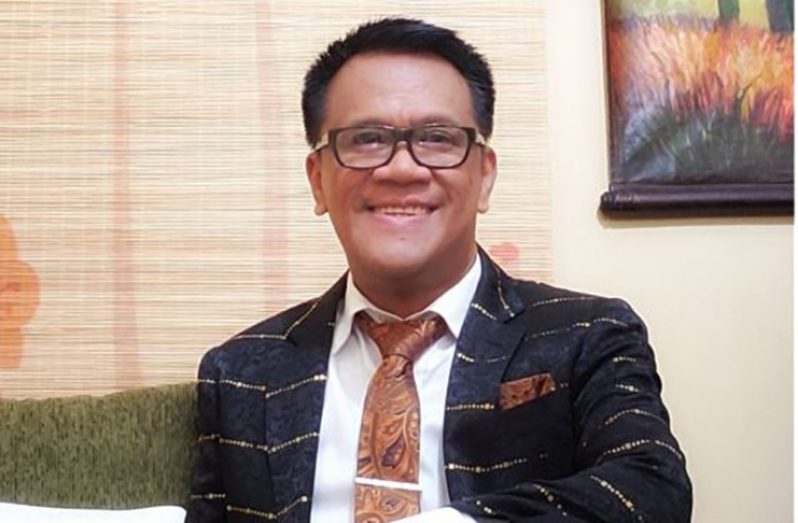– says psychologist, contends coping skills have to come from within
By Gabriella Chapman
THE coronavirus pandemic is affecting the world in more ways than physical health and these effects though vast in larger countries, are still infiltrating the borders of smaller third world countries such as Guyana.
Several parts of Guyana are adopting the isolation/social-distancing method of response to the virus to keep citizens safe.
However, this action will likely have many negative implications on individuals and by extension, the household.
In an interview with the President of the Guyana Psychological Association, Ren Gonzales, he discussed at length how persons can use this isolation period for psychological growth and development.
People being asked to stay home, they will most naturally be cut off from their regular routines for weeks. Hence, some common sources of stress during this period include a drop in meaningful activities, sensory stimuli and social engagement; financial strain from being unable to work; and a lack of access to typical coping strategies, such as going to the gym or attending religious services.
Gonzales said this is where the coping skills and the personal disposition of an individual will have to come into play. Any radical changes in the environment will impact an individual psychologically, mentally, and physically.
“By nature, we are social beings, and thus, it would be very difficult for us to be isolated. To be extricated from the daily routines that we have been accustomed to would really need a lot of adjustment. That means that we can be lonely, frustrated, angry, helpless, anxious, bored, and worried, because of the feelings of uncertainty and isolation,” he said.
Expounding further, Gonzales, said that extroverts will be most affected because they love the company of others and the outside world. “The introverts though, wouldn’t be affected so much because they find meaning in aloneness, or keeping few friends. Introverts are more accustomed to processing their own feelings and thoughts, whilst the extrovert’s way of coping is to seek the outside world. Thus, the latter will have to use a lot of adaptation skills in order for him/her to survive the “new” environment, that is, being in isolation,” Gonzales said.
POWER OF THE MIND
Recognising the aforementioned and to encourage cognitive behaviours during this time, he said it is important to note that thoughts precede feelings. Thoughts must have objective and scientific bases, otherwise, they will create unnecessarily negative feelings, he said. This is where persons will have to come to the realisation of the power of the mind.
“We must have control over our emotional reactions because our ability to control such will make us respond more rationally to challenging situations,” Gonzales said.
He added that positive imagery has proven to be effective. That is, when under stress, people try to think of beautiful and positive things against all odds. They may also distract themselves from overthinking through certain physical movements.
He said anxiety is reduced by activity, and so is depression. Thus, he is advising persons to do some exercises at home and involve the family.
“Create a new hobby and help others if you can because helping lifts the human spirit. So in dire situations we should be grateful for whatever little help we receive from others. That creates some peace of mind. If you are spiritually inclined, prayer and meditation can help ease the mind. Learning yoga can also be helpful. This time can be a chance for the family to pray together. Likewise, you can use social media for interaction, and for helping others,” he encouraged.
He also injected that it is important to rely on skills and competencies during times like these.
“Those who have more skills will have more chances to earn during a crisis. For example, at Eureka Labs, I encouraged the medical technologists and technicians to train for COVID-19 sample collection, as this can be an added skill which they can use in due time. The youth can also do some odd jobs in the meantime like sanitising houses and establishments, of course with the necessary and basic protection. They can help alleviate the family situation,” he explained.
Basically, persons can expand on their skillset to cope through periods of crisis.
ISSUE OF LOSS
At this point in time and perhaps continuing further down the line, a number of persons are experiencing losses, ranging from their jobs, financial security, and even the loss of loved ones.
Loss, Gonzales said, is almost always a precursor to negative emotions such as grief and depression, and one needs to look out for this.
“The basic question is how to survive and until when. We would like to have a sense of control over our destiny. However, with the COVID-19, things have become a little less bright and our sense of control has diminished. As an initial reaction, people will resist the changes and will come to a denial stage: The ‘why me’ stage. It is a process that we all have to go through until we are able to accept the reality, and hence, we shall move on. In the process of acceptance, it is important for us to know which things are under our control, and which are not. This is key to survival. Our attitudes, behaviour, and emotions are under our control, and therefore, this sense of control will equip us to fight the invisible enemy,” he advised.
IMPORTANCE OF INNER COPING
The expert also noted that when mobility is limited and access to many social services becomes less available, the coping skills of an individual will not be aided by the outside world as it used to, but rather by his internal world and immediate environment. The internal world refers to feelings, thoughts, and behaviour within the confines of one’s home and the immediate support would be one’s family.
“That being said, our sense of adaptability is not measured until we are in dire situations. The people who are able to adapt to whatever circumstances, will evolve as better persons in the end. Any calamity or malady, such as what the world is witnessing now, will also bring about opportunity, better adaptation skills, better management of emotions, and a realisation that our significant others (family and friends) are the best support that we have. It will also remind us all about the fact that life is short and whilst we are still alive, we need to seize the moment,” Gonzales elaborated.
In addition, this is a good chance for the family to come together and share resources. The family as a support group has proven to have positive therapeutic consequences.
“Love transcends everything, and if this is felt at home, then worries, and anxieties are all cushioned. This is a time for the family members to recognise that reality has changed abruptly, and parents should explain what are the present challenges, financially and psychologically, to their children. The communication lines must be open, because you’ll never know what is going on in the minds of the children. If family members start to be depressed, and if anyone has suicidal thoughts, the family must keep an eye 24/7 on that member. Otherwise, they can call professionals to deal with the situation,” he posited.
There is also the possibility that persons used work and school as escapes from unhappy homes. The senior psychologist said that this is a sad reality but it is what it is.
In his advice to individuals from such family settings, he said when choices are limited, persons need to adapt to the realities at home.
“It may not be ideal, or perfect, but it is our reality. I remember a clinical professor of mine who said: ‘If you cannot solve the problem, then try to learn to live with the problem.’ Easier said than done, yes, but what are our alternatives? In a lock down, you have to be home, but perhaps, you can establish safety nets, like calling a friend or relatives, a neighbour when in danger. If you have the option, staying with another relative or friend who is willing to accommodate you may alleviate the situation for the time being. If the home is extremely not a safe environment for children, then that is when the government agencies will have to be informed. There are protocols to be followed and there are some hotlines you can call. Keeping a list of the numbers you can call will be wise,” Gonzales said.
Positing further that “the only way we can fight COVID-19 is through a multi-level, multi-approach, and multi-agency collaborations.”




.png)









